Gardeners Outside London: Cultivating Green Spaces Beyond the City
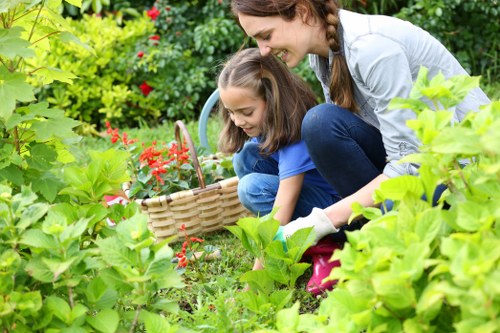
London, with its bustling streets and towering buildings, offers limited green spaces for gardening enthusiasts. However, just outside the city, a wealth of opportunities awaits gardeners looking to cultivate their own green havens. From expansive allotments to serene countryside gardens, the areas surrounding London provide ideal settings for both novice and experienced gardeners.
Whether you're seeking space for vegetable patches, colorful flower beds, or tranquil retreats, the outskirts of London cater to a variety of gardening needs. In this article, we explore the best areas for gardeners outside London, highlighting their unique features and proximity to the capital.
Understanding the local climate, soil types, and plant varieties is crucial for successful gardening. Fortunately, the regions surrounding London offer diverse conditions that support a wide range of flora, ensuring that every gardener can find a suitable environment for their plants.
Why Garden Outside London?
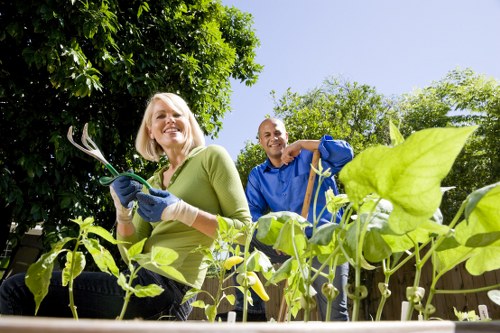
Gardening outside London comes with numerous benefits that go beyond the obvious advantage of having more space. The quieter environment, reduced pollution, and closer connection to nature enhance the gardening experience, making it more enjoyable and fulfilling.
Additionally, the cost of land and gardening plots tends to be more affordable outside the city. This affordability allows gardeners to invest in better tools, quality soil, and a wider variety of plants, ultimately leading to more productive and vibrant gardens.
Moreover, gardening communities outside London are often tight-knit, providing ample opportunities for knowledge sharing and collaboration. Whether through local gardening clubs, community gardens, or online forums, gardeners can find support and inspiration from like-minded individuals.
Benefits of Gardening in Suburban Areas
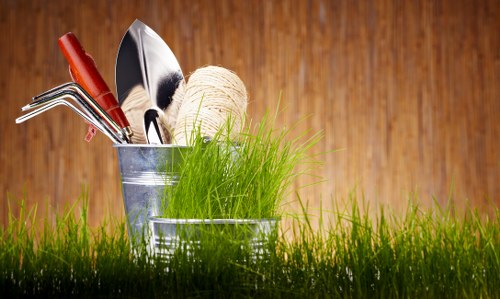
Suburban areas around London offer the perfect balance between accessibility and tranquility. These regions provide ample space for large gardens while still being within a reasonable distance from the city, making them ideal for those who want the best of both worlds.
The diverse landscapes in suburban areas allow gardeners to experiment with different gardening styles, from traditional English gardens to modern sustainable practices. Additionally, the proximity to London ensures access to gardening supplies, workshops, and expert advice.
Environmental factors in suburban areas, such as better air quality and more sunlight, contribute to healthier plants and more successful gardening outcomes. These conditions are particularly beneficial for growing a wide range of plants, including vegetables, herbs, and ornamental flowers.
Choosing the Right Location
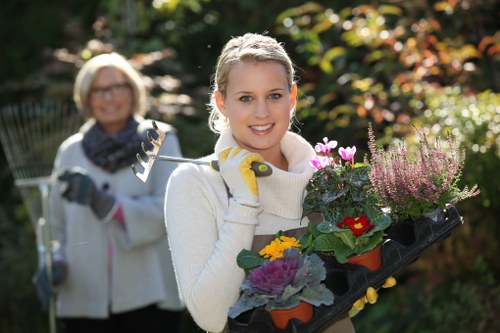
Selecting the appropriate location for your garden is essential for its success. Factors such as sunlight exposure, soil quality, and drainage must be considered to ensure that your plants thrive.
In areas outside London, many spaces offer rich, fertile soil ideal for a variety of plants. However, it's important to assess the specific conditions of your chosen spot, including any potential shade from nearby buildings or trees that might affect sunlight exposure.
Additionally, proximity to water sources and access to gardening infrastructure, such as sheds and greenhouses, can significantly enhance your gardening experience. Taking the time to evaluate these factors will help you create a garden that is both beautiful and productive.
Essential Gardening Tips for the Suburbs
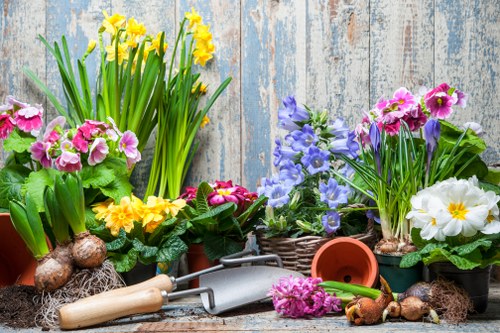
Gardening outside London requires some specific strategies to maximize the potential of your space. Here are a few essential tips to ensure your garden flourishes:
- Soil Preparation: Test your soil's pH and nutrient levels to determine what amendments are needed. Adding compost or manure can greatly improve soil fertility.
- Plant Selection: Choose plants that are well-suited to the local climate and soil conditions. Consider both aesthetic and functional aspects when selecting your garden plants.
- Water Management: Implement efficient irrigation systems to conserve water and ensure your plants receive adequate moisture.
- Pest Control: Use natural pest control methods to protect your plants without harming the environment.
- Seasonal Planning: Plan your garden according to the seasons, ensuring that you plant and harvest at the optimal times for each type of plant.
By following these tips, gardeners outside London can create thriving gardens that provide both beauty and sustenance.
Top Areas for Gardeners Outside London
There are several areas surrounding London that are particularly popular among gardeners. These regions offer the perfect combination of space, resources, and community support, making them ideal for cultivating beautiful gardens.
Essex
Essex, located northeast of London, is renowned for its fertile soil and favorable climate. Gardeners here can enjoy growing a wide variety of plants, including vegetables, flowers, and fruit trees. The county also hosts numerous gardening shows and events, providing ample opportunities for learning and networking.
Hertfordshire
Hertfordshire, situated to the north of London, offers a mix of rural and suburban environments perfect for gardening. With its rich agricultural heritage, the area boasts excellent soil conditions and a long planting season. Additionally, local nurseries and garden centers provide a diverse range of plants and supplies.
Kent
Kent, often referred to as the "Garden of England," is famed for its lush orchards and picturesque gardens. The region's mild climate and diverse landscapes make it an ideal location for gardeners looking to grow a variety of plants, from ornamental flowers to market vegetables.
Suffolk
Suffolk, located to the northeast of London, is another excellent area for gardening. The county's combination of fertile land and supportive gardening communities makes it a favorite among both hobbyists and professional gardeners.
Berkshire
Berkshire, southwest of London, offers a blend of suburban and rural settings ideal for gardening. The area's proximity to the capital ensures easy access to gardening resources, while its expansive green spaces provide ample room for creative gardening projects.
Surrey
Surrey, located southwest of London, is known for its beautiful countryside and extensive horticultural opportunities. Gardeners here can take advantage of the region's diverse plant life and participate in various local gardening events and workshops.
Bedfordshire
Bedfordshire, situated to the northwest of London, offers a serene environment for gardening enthusiasts. The county's rich history of agriculture and abundant green spaces make it an ideal location for cultivating beautiful and productive gardens.
Hampshire
Hampshire, located to the southwest of London, provides gardeners with a variety of climates and soil types to suit different gardening needs. From coastal gardens to inland vegetable plots, Hampshire accommodates a wide range of gardening styles.
Bedfordshire
Bedfordshire, situated to the northwest of London, is another excellent area for gardening enthusiasts. The county offers a combination of fertile soil and diverse plant life, making it perfect for both flower gardens and vegetable patches.
Buckinghamshire
Buckinghamshire, located to the northwest of London, boasts a picturesque landscape ideal for gardening. The area's rich soil and favorable climate support a variety of plants, from vibrant flowers to hearty vegetables.
West Sussex
West Sussex, southwest of London, is renowned for its beautiful gardens and agricultural heritage. Gardeners in this region benefit from the mild climate and ample sunshine, which promote healthy plant growth and vibrant blooms.
Oxfordshire
Oxfordshire, located to the northwest of London, offers a mix of rural charm and modern amenities for gardeners. The county's extensive green spaces and supportive gardening communities make it an attractive destination for those looking to cultivate their own gardens.
Essex
Returning to Essex, it's worth noting the county's strong gardening infrastructure, including numerous nurseries, garden centers, and agricultural fairs. These resources provide gardeners with everything they need to create and maintain beautiful gardens.
Community and Resources for Gardeners
Gardening outside London offers more than just space and resources; it also provides access to vibrant communities that share a passion for cultivating plants and green spaces. Engaging with these communities can enhance your gardening experience, offering support, inspiration, and opportunities for collaboration.
Local Gardening Clubs
Joining a local gardening club is an excellent way to connect with fellow gardeners. These clubs often organize events, workshops, and plant exchanges, fostering a sense of community and shared learning.
Community Gardens
Community gardens provide a space where individuals can collaborate on gardening projects, share resources, and enjoy the benefits of collective effort. These gardens are particularly beneficial for those who may lack their own gardening space but still wish to cultivate plants.
Workshops and Events
Many areas outside London host regular gardening workshops and events, offering opportunities to learn new techniques, discover innovative gardening tools, and stay updated on the latest trends in horticulture.
Online Forums and Groups
In addition to physical communities, online forums and social media groups provide a platform for gardeners to ask questions, share experiences, and seek advice from a broader audience. These digital communities are invaluable resources for troubleshooting and inspiration.
Sustainable Gardening Practices
Sustainability is becoming increasingly important in gardening, and many gardeners outside London are adopting eco-friendly practices to minimize their environmental impact. Embracing sustainable gardening not only benefits the planet but also promotes healthier plant growth and long-term garden viability.
Composting
Composting is a fundamental sustainable practice that involves recycling organic waste into nutrient-rich soil. By composting kitchen scraps and garden waste, gardeners can reduce landfill contributions and enhance soil fertility naturally.
Rainwater Harvesting
Harvesting rainwater is an effective way to conserve water and reduce reliance on municipal supplies. Installing rain barrels or other collection systems allows gardeners to utilize natural rainfall for irrigation, promoting water efficiency.
Native Plants
Planting native species supports local ecosystems and requires less maintenance, as these plants are naturally adapted to the area's climate and soil conditions. Native plants also provide essential habitats for local wildlife, enhancing biodiversity.
Organic Gardening
Organic gardening avoids the use of synthetic fertilizers and pesticides, opting instead for natural alternatives. This approach promotes healthier soil, reduces pollution, and safeguards beneficial insects and wildlife.
Permaculture
Permaculture is a holistic gardening approach that designs agricultural systems inspired by natural ecosystems. By focusing on sustainability, diversity, and resilience, permaculture principles help create gardens that are both productive and environmentally friendly.
Gardening Tools and Supplies
Equipping yourself with the right tools and supplies is essential for maintaining a thriving garden. Areas outside London offer a wide range of gardening stores and suppliers, ensuring that gardeners have access to high-quality equipment and materials.
Local Nurseries
Local nurseries provide a diverse selection of plants, seeds, and gardening essentials. These establishments often carry region-specific varieties that are well-suited to the local climate, making it easier for gardeners to select the best plants for their gardens.
Garden Centers
Garden centers outside London typically offer a comprehensive range of gardening tools, from basic hand tools to specialized equipment. Additionally, many garden centers provide expert advice and workshops to help gardeners enhance their skills.
Online Suppliers
Online gardening suppliers offer convenience and variety, allowing gardeners to purchase tools, seeds, and materials from the comfort of their homes. Many online stores also provide detailed product descriptions and customer reviews to help you make informed purchasing decisions.
Farmers Markets
Farmers markets not only supply fresh produce but also offer a selection of gardening supplies and plants. These markets are an excellent place to find unique and locally-grown varieties, as well as to support local businesses.
Tool Libraries
Tool libraries allow gardeners to borrow expensive or seldom-used tools, reducing the need for individual purchases. This resource is particularly useful for gardeners who want to try new tools without committing to a full purchase.
Seasonal Gardening in the Suburbs
Gardening is a year-round activity with each season offering unique challenges and opportunities. Understanding how to adapt your gardening practices to the changing seasons can lead to more successful and productive gardens.
Spring
Spring is the perfect time to prepare your garden for the growing season. Start by clearing out any winter debris, enriching the soil with compost, and planting early spring vegetables and flowers. It's also a great time to sow seeds for summer blooms.
Summer
During the summer months, focus on maintaining your garden by watering regularly, weeding, and staking plants as needed. Harvesting early crops and enjoying the vibrant colors of summer flowers can make this season particularly rewarding.
Autumn
Autumn is ideal for planting perennials, bulbs, and preparing your garden for the winter. Mulching helps protect plant roots from cold temperatures, and harvesting late-season crops ensures that you make the most of your garden's productivity.
Winter
Winter gardening involves planning for the upcoming year. Prune trees and shrubs, protect sensitive plants from frost, and start planning your garden layout. It's also an excellent time to engage in indoor gardening, such as growing herbs on a windowsill.
Gardening Success Stories
Many gardeners outside London have transformed their spaces into thriving green retreats. These success stories highlight the potential of suburban gardening and offer inspiration for others looking to cultivate their own gardens.
Transforming Urban Allotments
Urban allotments outside London have become hotspots for gardening enthusiasts. By utilizing limited space creatively, gardeners have managed to grow abundant vegetable patches and vibrant flower beds, creating lush oases in urban settings.
Creating Sustainable Gardens
Gardeners embracing sustainable practices have achieved remarkable results. From composting and rainwater harvesting to planting native species, these eco-friendly gardens not only look beautiful but also contribute positively to the environment.
Community Garden Projects
Community garden projects outside London have brought neighbors together to cultivate shared green spaces. These projects foster a sense of community, promote social interaction, and provide fresh produce for local residents.
Maintaining Your Garden
Maintaining a garden requires consistent effort and attention. Proper maintenance ensures that your plants remain healthy, your garden stays organized, and your outdoor space continues to thrive throughout the year.
Regular Watering
Consistently watering your garden is crucial for plant health. Establish a watering schedule that accounts for the specific needs of your plants and the local climate, ensuring that each plant receives adequate moisture without overwatering.
Pruning and Trimming
Pruning and trimming help maintain the shape and health of your plants. Remove dead or diseased branches, encourage new growth, and prevent overcrowding by regularly trimming foliage and stems.
Weeding
Weeds compete with your plants for nutrients, light, and water. Regular weeding prevents weed infestations and ensures that your garden plants have the resources they need to thrive.
Fertilizing
Fertilizing provides essential nutrients that may be lacking in the soil. Use organic or synthetic fertilizers according to your plants' needs, and apply them at the appropriate times to promote healthy growth.
Pest and Disease Management
Monitoring your garden for pests and diseases is vital for maintaining plant health. Implement integrated pest management strategies, such as introducing beneficial insects or using natural remedies, to control infestations without harming the environment.
Innovative Gardening Techniques
Adopting innovative gardening techniques can enhance your gardening efficiency and productivity. These methods often focus on sustainability, space optimization, and maximizing yields.
Vertical Gardening
Vertical gardening involves growing plants upwards, utilizing trellises, walls, or other vertical structures. This technique is ideal for small spaces and allows gardeners to cultivate more plants without taking up additional ground space.
Hydroponics
Hydroponics is a soil-less gardening method that uses nutrient-rich water to grow plants. This innovative technique can increase growth rates and yields, making it a popular choice for urban gardeners with limited space.
Companion Planting
Companion planting involves growing different plant species together to enhance growth, repel pests, and improve soil health. By strategically pairing plants, gardeners can create a more resilient and productive garden ecosystem.
Permaculture
Permaculture is a sustainable gardening approach that mimics natural ecosystems. It emphasizes diversity, resilience, and resource efficiency, helping gardeners create harmonious and productive gardens.
Greenhouses and Cold Frames
Using greenhouses and cold frames allows gardeners to extend the growing season, protect plants from harsh weather, and cultivate exotic species. These structures provide a controlled environment that supports year-round gardening.
Gardening Challenges Outside London
While gardening outside London offers many advantages, gardeners may also encounter specific challenges. Understanding these obstacles and preparing to address them can lead to more successful gardening endeavors.
Pest Management
The increased space and diversity of plants outside London can attract a variety of pests. Effective pest management strategies, such as biological controls and preventive measures, are essential to protect your garden.
Weather Extremes
Areas outside London may experience more extreme weather conditions, including heavy rains, strong winds, and temperature fluctuations. Implementing protective measures, such as windbreaks and proper drainage, can help mitigate these effects.
Soil Quality
While many regions outside London boast fertile soil, others may require amendments to support healthy plant growth. Regular soil testing and the addition of organic matter can improve soil structure and fertility.
Access to Resources
Although gardening resources are generally available, some rural areas might have limited access to gardening centers and suppliers. Planning ahead and utilizing online resources can help overcome this challenge.
Future Trends in Gardening Outside London
The world of gardening is continuously evolving, with new trends and technologies shaping the way gardeners cultivate their spaces. Looking ahead, several trends are expected to influence gardening practices outside London.
Smart Gardening
Smart gardening involves using technology, such as automated irrigation systems and smart sensors, to optimize plant care. These innovations can make gardening more efficient and less labor-intensive.
Urban Farming
Urban farming techniques, adapted for suburban and rural settings, are gaining popularity. This approach focuses on producing food locally and sustainably, reducing the carbon footprint associated with transportation.
Biophilic Design
Biophilic design emphasizes the integration of natural elements into garden spaces, promoting a stronger connection between humans and nature. This trend enhances the aesthetic appeal and psychological benefits of gardening.
Resilient Gardening
Resilient gardening focuses on creating gardens that can withstand environmental stresses, such as climate change and extreme weather. This includes selecting hardy plant varieties and implementing sustainable practices.
Edible Landscaping
Edible landscaping combines functionality with beauty by incorporating food-producing plants into garden designs. This trend promotes self-sufficiency and adds a practical dimension to ornamental gardens.
Conclusion
Gardening outside London offers a plethora of opportunities for those looking to cultivate their own green spaces. From the fertile soils of Essex to the picturesque landscapes of Kent, the areas surrounding the capital provide ideal conditions for a variety of gardening pursuits.
By leveraging local resources, engaging with gardening communities, and adopting sustainable practices, gardeners can create thriving and beautiful gardens that enhance their quality of life and contribute positively to the environment.
Whether you're an experienced gardener or just starting, the outskirts of London offer the perfect backdrop for your gardening journey. Embrace the space, explore the possibilities, and watch your garden flourish beyond the city's borders.
Frequently Asked Questions
- What are the best areas outside London for vegetable gardening?
Areas like Essex, Hertfordshire, and Kent are ideal for vegetable gardening due to their fertile soils and favorable climates. These regions offer ample space and resources for growing a wide variety of vegetables.
- How can I start a community garden outside London?
Begin by gathering a group of interested individuals, securing a suitable location, and obtaining any necessary permissions or permits. Contacting local gardening clubs or councils can also provide support and resources to help establish a community garden.
- What sustainable practices can I implement in my garden?
Implementing practices such as composting, rainwater harvesting, planting native species, and using organic fertilizers can make your garden more sustainable. Additionally, adopting permaculture principles can enhance your garden's resilience and productivity.
- Are there gardening clubs or groups I can join near London?
Yes, many areas outside London have local gardening clubs and community gardens. These organizations offer a platform for gardeners to share knowledge, participate in events, and collaborate on gardening projects.
- What are some challenges of gardening outside London?
Challenges may include pest management, extreme weather conditions, soil quality variations, and limited access to gardening resources in some rural areas. Planning and adopting appropriate strategies can help overcome these obstacles.